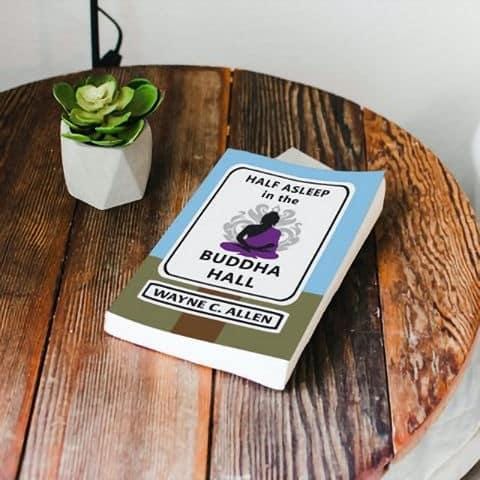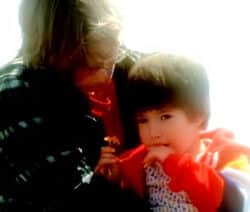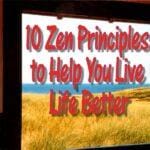- Zen 101 — Essential Zen Lessons
- Zen 101 — More Zen Ideas
- Zen 101 — Self-Responsibility
- Zen for the Holidays — 10 Tips
- Zen and Clarity — Zen Principles
- Zen and Innocence — Zen Principles
- Zen and Clinging — Zen Principles
- Zen and Karma — Zen Principles
- Zen and Emotional Balance — Zen Principles
- Zen and Simple Presence — Zen Principles
- Zen Living: 5 Ways to Land
- The Emptiness of Everything
Zen and Karma — karma is not a system of rewards and punishments, or even a “what goes around comes around” philosophy. It’s a statement that all things are interrelated, and results have causes.

Looking for more on this topic?
Check out my book,
Half Asleep in the Buddha Hall.
My “Eastern” book takes you by the hand and helps you to find peace of mind.
Half Asleep in the Buddha Hall is a Zen-based guide to living life fully and deeply.
(Here’s a direct Amazon link)
Purchase digital versions (Apple, Nook, Kobo, etc.) from this page

In his book “Body Mind Balancing,” OSHO describes our “disconnect” from our bodies; needless to say, a topic of some interest to me.
He wrote that we are conditioned, as infants, to be miserable and needy. He then wrote that the opposite emotions or feelings — bliss or happiness — are looked upon, at the least, with suspicion.
Pleasant, placid, happy babies often get less attention than a baby that is squalling, squealing, and constantly complaining.
He thought that this predisposes kids to think that misery is the key to getting attention. (I have to say it: think Trump! His entire life is based upon just such a whiny, picked-upon position.)
As you walk down the street, you are much more likely to see bland, blank, or scowling faces – and you likely think this is normal. Seeing someone walking toward you smiling and laughing to himself seems, well, threatening or perverse.
Let’s just agree that we are predisposed to looking on the gloomy side of things – to looking for what is wrong – either with externals (“My diaper pin is poking me!”) or internals (“I’m hungry. I’m thirsty. I’m bored. Fix me! Fix me!”)
And then, folk get into a relationship… and each demands the other person’s total attention and endless deference. Since they are both doing it, it boils down to this: the two children can’t get along.
One of the main things to “get” is that we create every aspect of our own reality, and I mean every aspect. Another way to say this is “our life consists of our karma.”
In Buddhist teaching, the law of karma, says only this:
For every event that occurs, there will follow another event whose existence was caused by the first, and this second event will be pleasant or unpleasant depending upon whether its cause was skillful or unskillful.’
A skillful event is one that is not accompanied by craving, resistance or delusions; an unskillful event is one that is accompanied by any one of those things. (Events are not skillful in themselves, but are so called only by virtue of the mental events that occur with them.) Law of Karma
Therefore, the law of Karma teaches that actions produce results; the result of any action is born by the person who commits it.
Now, the normal description of karma typically includes the idea of past lives, as in, “I must have done something really bad in my past life to deserve this.” I’d like you to put that aspect aside, as this is not even close to the actual intent of the word. It’s just a complication, and the last thing you need is some other distraction to keep you stuck.
Karma is not a punishment. It’s simply an explanation of cause and effect.

What this means is that you are (we all are) a closed system. What goes on inside of you is “all you, all the time.”
For example, no one makes you angry — a situation occurs, and you either anger yourself, or you do not. This is why one person has one reaction and another person has another reaction, when dealing with the same situation.
The feelings that arise in you are neutral. If you simply watch the feeling, it dissipates, (a reason to meditate). If you label and judge the feeling, then you begin to cling.
To what? To the story you invented about the feeling. For example, if you think people are out to get you, you’ll add a “victim” story to the feeling, and blame someone or something.
And even this is not Karma.
If, then, you decide to tell off the other person, or pull a sob story, or whatever, now you’re generating Karma. Because what you do generates a reaction or response. Your action led to a reaction (even the reaction of ‘no reaction,’) and your Karma is to deal with what you have created.
As an exercise and explore the Zen Principles: Zen and Karma. I want you to stop, right now, and think about all aspects of your life, including:
- Money or debt
- Job or vocation
- Relationship(s)
- How you view your sex life
- View of yourself (self-image)
- Your main daily focus (is it positive or negative)
How’d you do? How are you feeling about yourself, your life, and your relationships?
Now, here’s the karma piece:
Every single aspect of everything you just thought about is a direct result of your past decisions, choices, and “paths chosen.“
Not part of it, not most of it, but every single bit of it.
Of course it’s human nature to want to find something, anything, anyone, to blame for who and where you are.
But in order to move on, to finally reach a point of purposeful peace and contentment, you have to accept total responsibility for every aspect of your life: You caused it, you set it in motion, and you made it happen. If you will not accept this reality, you will remain a perpetual victim.
Your life is exactly and precisely what you made it and make it to be.

Where you are right now is the result of your past choices, and your present mood and temperament have a lot to do with where your head has been for the last year. Thus, today was set in motion by you last year!
And because you are so good at imagining and planning out imaginary scenarios, you unconsciously committed to being where you are right now, and have denied any evidence to the contrary to what you believed and set in motion.
The way out begins, of course, today — how you think and what you tell yourself, today and from now on.
If you want a different life a year from now, you must begin right now. And you must put as much energy into what you want (the new path) as you have put into what you believed and did in the past. No excuses.
Let me be clear. I am not suggesting that you substitute blaming yourself for blaming everyone else.
Blaming is not an action, it’s an addiction! The key is to accept that you are who you are as a product of your choices, and to simply move on by acting differently. No blame, just self-responsibility.
When Darbella and I led training events, we always started by playing The Eagles “Get Over It.” Here’s the last verse:
It’s like going to confession every time I hear you speak
You’re makin’ the most of your losin’ streak
Some call it sick, but I call it weak
You drag it around like a ball and chain
You wallow in the guilt; you wallow in the pain
You wave it like a flag, you wear it like a crown
Got your mind in the gutter, bringin’ everybody down
Complain about the present and blame it on the past
I’d like to find your inner child and kick it’s little ass.
The time is now, and now is when we make things new again. If you don’t like where you are, change your karma. In this moment. No blame. No excuses.





